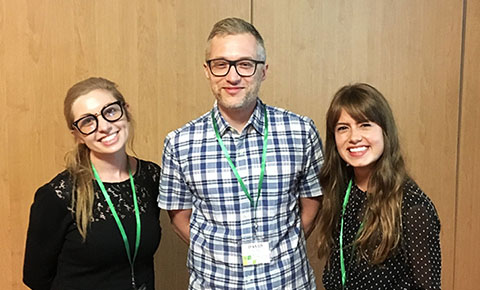Meet David Rapp: Director of Undergraduate Education

Northwestern University’s David Rapp, who researches language, memory, and why we’re so susceptible to misinformation, has assumed his new role as director of undergraduate education at the School of Education and Social Policy (SESP).
Rapp, professor of learning sciences and psychology, succeeds Jeannette Colyvas, who spearheaded a two-year project to enrich the undergraduate curriculum.
Colyvas, associate professor of human development and social policy and associate professor of learning sciences, also helped update the practicum internship to reflect changes in the modern workplace, give students a wider range of opportunities, and emphasize experiential learning.
“The innovative design of our curriculum blows open choice, innovation, and freedom because students aren’t tied to a pre-conception of what their profession has to be when they declare their major,” Colyvas said. “Whether it’s law school, pre-med, business, or non -profit work, there’s a pathway through one of our concentrations that will get them there.”
Rapp, a first-generation college student, was raised in Queens, N.Y., by a single mom and grandparents in an immigrant household. As a high school senior, he took a psychology and a sociology course at the City of New York’s Queens College, which stoked his interest in both subjects.
Though he wasn’t initially sold on being an academic, he blazed through his courses, earning his master’s degree in one year at New York University and his doctorate in psychology at the State University of New York in Stony Brook in just four years.
At Northwestern, he was named SESP’s Outstanding Professor in 2019 and he and his students have received Undergraduate Research Assistant Program Awards (URAPs) almost every year since he joined Northwestern in 2006.
He has previously been named a Charles Deering McCormick Professor of Teaching Excellence, Northwestern's highest teaching award. A journal editor and prolific researcher, he also has served on the board of several organizations, including Reading With Pictures, which advocates using comics in the classroom and beyond to promote literacy.
“David is extremely dedicated to the success and wellbeing of his students,” said Nikita Salovich, a cognitive psychology PhD student who has worked in Rapp's lab as a graduate student and researcher for the past three years. “He’s not only a passionate and innovative researcher, producing groundbreaking work in understanding human learning, memory, and cognition, but also one of the most thoughtful mentors I have had the pleasure of working with.”
Five more things you might not know about David Rapp:
He was born in Australia. But he is a New Yorker at heart. His mother returned to Queens, N.Y., when he was an infant.
He loves libraries. Rapp’s mother took him to the library at least twice a week, starting in kindergarten. He worked in a library throughout high school, where he was in charge of magazines, science fiction, humor, and the classics, genres he still adores. “The classics section drew me in; that’s where my interest in how people think about literacy began,” he said. “I’d want to know, ‘how do authors decide what they’re going to write? What makes a book a classic?’” Fun fact: When Rapp can, he drives within and outside of Chicago to visit and use public libraries as his office for the day.
He is invested in undergraduates. Rapp welcomes undergraduates into his Reading Comprehension Lab and teaches both the honors seminar and introduction to cognitive psychology. “David's commitment to get to know each of his students individually is one of his most admirable qualities,” Salovich said. “We can barely get from one end of campus to the other without David stopping and chatting with a former student or colleague.” He served as the Residential College Faculty Chair for the College of Culture and Community Studies from 2013 to 2019. In that role, he organized activities, took students into Chicago on adventures, and facilitated events to help enrich the Northwestern experience. “Serving as the director of undergraduate studies seems like a natural next step to support undergraduates at an even bigger level,” he said.
He’s an expert on misinformation. Rapp investigates how to help people detect false information and avoid using it later. His work involves documenting different types of fake news to learn more about where and when it occurs and how it influences individual decisions. The data he collects also helps news consumers detect and reject fake news. He’s currently looking at how confident people are about what they know, and how often they fall victim to inaccurate information. “People who believe they know the most often turn out to be the most likely to pick up inaccurate information,” he said. “This is a problem if they are also the least willing to contemplate alternatives.” Rapp actively collaborates with faculty in the Medill School of Journalism, Media, Integrated Marketing Communications; Feinberg School of Medicine; Weinberg College of Arts and Sciences; and colleagues in SESP to study news comprehension issues, medical literacy, and people’s everyday literacy experiences.
He loves recommending books, both classics and comics. Some of Rapp’s favorite works include Don Quixote by Miguel Cervantes, Watchmen by Alan Moore and Dave Gibbons, The Jungle by Upton Sinclair, Invisible Man by Ralph Ellison, and Dune by Frank Herbert. “Reading is what made me who I am, and it’s what informs my research,” he said. “I love finding out others’ favorite books and searching for themes that connect even the most disparate works.”